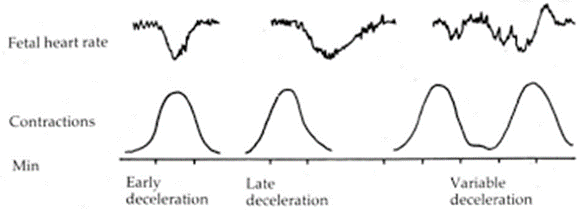The nurse is administering Terbutaline (Brethine) to a pregnant woman to stop preterm labor. Which finding indicates an adverse reaction and the Physician must be notified?
Select one:
Maternal hypotension
Pulmonary edema.
Fetal bradycardia
Fetal hypokalemia
Fetal hypokalemia
The Correct Answer is B
a. Maternal hypotension is not a common side effect of terbutaline, which is a beta-adrenergic agonist that can cause tachycardia and hypertension.
b. Pulmonary edema is a serious complication of terbutaline therapy, which can cause fluid overload, dyspnea, chest pain, and crackles in the lungs. The nurse should monitor the woman's vital signs, oxygen saturation, urine output, and lung sounds, and report any signs of pulmonary edema to the physician immediately.
c. Fetal bradycardia is not related to terbutaline, which can cause fetal tachycardia.
d. Fetal hypokalemia is also not associated with terbutaline, which can cause maternal hypokalemia due to increased potassium uptake by the cells.
Nursing Test Bank
Naxlex Comprehensive Predictor Exams
Related Questions
Correct Answer is D
Explanation
a. This is a common cause of variable decelerations, not early decelerations.
b. This is not a cause of early decelerations.
c. This is a common cause of variable decelerations, not early decelerations.
d. This is the cause of early decelerations and is a normal response to the pressure of the fetal head on the cervix during contractions.

Correct Answer is ["D"]
Explanation
a. This is an important recommendation for overall health but is not specifically related to reducing the risk of NTDs.
b. This is an important recommendation for overall health but is not specifically related to reducing the risk of NTDs.
c. This is an important recommendation for overall health but is not specifically related to reducing the risk of NTDs.
d. Folic acid supplementation before and during pregnancy has been shown to reduce the risk of NTDs in newborns.
Whether you are a student looking to ace your exams or a practicing nurse seeking to enhance your expertise , our nursing education contents will empower you with the confidence and competence to make a difference in the lives of patients and become a respected leader in the healthcare field.
Visit Naxlex, invest in your future and unlock endless possibilities with our unparalleled nursing education contents today
Report Wrong Answer on the Current Question
Do you disagree with the answer? If yes, what is your expected answer? Explain.
Kindly be descriptive with the issue you are facing.
